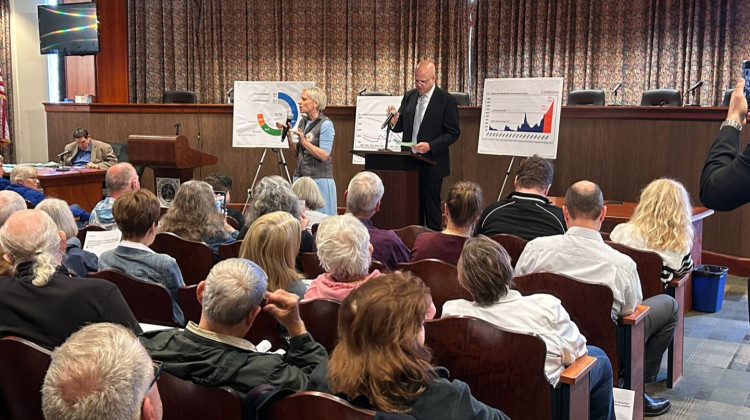President Trump’s tariffs on imported steel and aluminum go into effect Friday, and they could negatively impact a growing industry in Indiana.
The Brewers Association says canning is the most popular method for new breweries. That has some Indiana brewers worried the tariffs could stunt growth and increase prices for consumers.
When you walk into the taproom at Sun King Brewing in Indianapolis, one of the first things you notice is the noise. There’s the constant hum of brewing equipment in the background, and some of it comes from the nearby canning line.
An automatic belt twists and turns cans through the room, as they’re sanitized, filled, sealed and packaged.
“Last year, we produced the equivalent of 30,000 barrels worth of beer, which is 60,000 kegs of beer,” says Sun King co-founder and owner Clay Robinson. “And, a little over 50 percent of it went into aluminum cans.”
Sun King is one of the largest breweries in Indiana. The owners decided to can beer long before it became popular across the industry.
“We were actually the 53rd canning craft brewery in America,” Robinson says. “And, since that time it’s grown to upwards of 600 or 700 canning breweries.”
Canning beer is more economical for most breweries. The cans protect the beer from sunlight and oxygen, and are lighter to transport.
But costs for breweries who package their beer in cans will likely go up with the introduction of a 10 percent tariff on most imported aluminum.
The Brewers Association says 98 percent of the metal they use is produced and made into cans in the U.S. But, they worry the tariffs could incentivize an overall rise in aluminum prices.
“We have a contract on our aluminum for the entire year of 2018, so we won’t see any major impact on it until the beginning of next year,” Robinson says. “But, that will be something that once it goes into place and we find out what it’s going to do to the cost of aluminum, we’ll have to find out what that does to the overall cost of beer.”
Smaller Indiana breweries like Taxman Brewing in Bargersville are more likely to feel the immediate impact of the tariffs. About half of the beer Taxman produces every year is canned.
The brewery’s suppliers encouraged them to stockpile as many as possible at the current price, to temporarily avoid increased costs. But, they don’t have the storage space to do that.
“Cans are always funny because you have to, when getting printed cans, order a truckload, which is 25 pallets of 8,169 cans each,” says Chief Production Officer Colin McCloy. “That’s a lot of cans at once.”
McCloy says it’s too early to tell just how much more they’ll have to pay for cans, but he says it’s an increased cost they’ll have to figure out how to make up.
“There is a possibility that our prices will have to reflect it,” he says. “Obviously that’s a last resort.”
Keith Belton is director of the Manufacturing Initiative at Indiana University. He says it’s likely a lot of industries – not just breweries – will have to pass on the increased costs to consumers. And it could happen soon.
”I would say that you will see price increases from producers to their customers pretty immediately after march 23, if not already in anticipation of March 23,” Belton says. “And, then the impacts on the downstream industries to occur within the span of weeks to months.
But here’s the silver lining – Belton says the price increase could be so minimal on something like a can of beer that you might not even notice.
“The price of a car for example, because it has steel and aluminum in it, could be expected to rise by as much as 1 percent as a result of these tariffs,” he says. “And, the price of say a can of soup could be expected to rise less than a penny.”
With even some of Indiana’s smaller breweries on track to can more than a million beers this year, even a slight increase will add up to a significant cost.
And, brewers say it’s more than just cans they’re worried about.
“Aluminum cans are in people’s hands everyday, so it’s a really easy thing to talk about,” Robinson says. “But, the back end of our industry is run by stainless steel, so any increase in the price of materials definitely affects people’s ability to grow their businesses.”
At the same time, steel and aluminum producers in Indiana stand to benefit from the tariffs. They could increase their market share or raise prices as a result of the action.
 DONATE
DONATE








 Support WFYI. We can't do it without you.
Support WFYI. We can't do it without you.